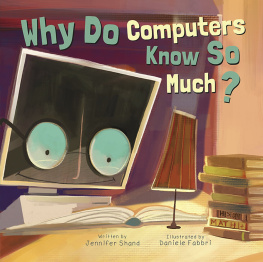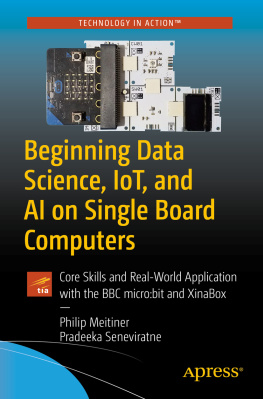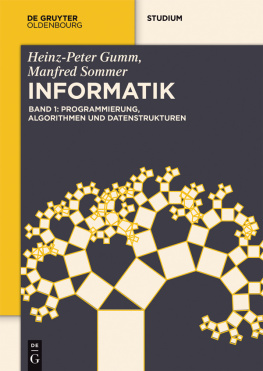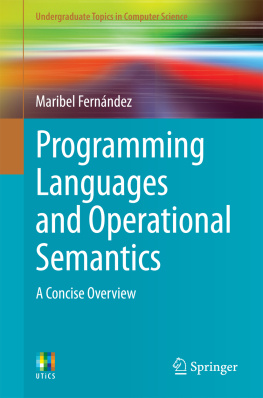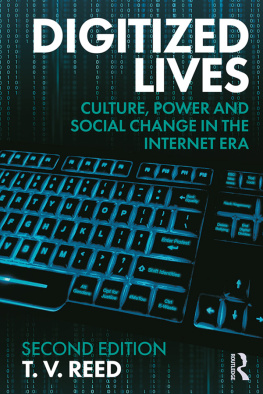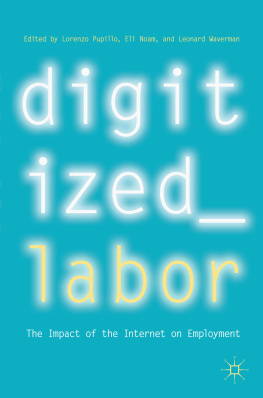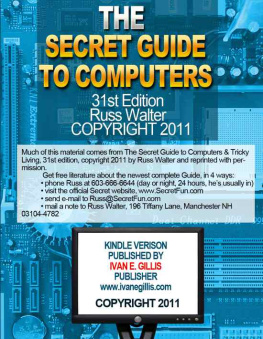Informatik - Digitized: the science of computers and how it shapes our world
Here you can read online Informatik - Digitized: the science of computers and how it shapes our world full text of the book (entire story) in english for free. Download pdf and epub, get meaning, cover and reviews about this ebook. City: Oxford, year: 2012, publisher: Oxford University Press, genre: Art. Description of the work, (preface) as well as reviews are available. Best literature library LitArk.com created for fans of good reading and offers a wide selection of genres:
Romance novel
Science fiction
Adventure
Detective
Science
History
Home and family
Prose
Art
Politics
Computer
Non-fiction
Religion
Business
Children
Humor
Choose a favorite category and find really read worthwhile books. Enjoy immersion in the world of imagination, feel the emotions of the characters or learn something new for yourself, make an fascinating discovery.

- Book:Digitized: the science of computers and how it shapes our world
- Author:
- Publisher:Oxford University Press
- Genre:
- Year:2012
- City:Oxford
- Rating:4 / 5
- Favourites:Add to favourites
- Your mark:
- 80
- 1
- 2
- 3
- 4
- 5
Digitized: the science of computers and how it shapes our world: summary, description and annotation
We offer to read an annotation, description, summary or preface (depends on what the author of the book "Digitized: the science of computers and how it shapes our world" wrote himself). If you haven't found the necessary information about the book — write in the comments, we will try to find it.
Informatik: author's other books
Who wrote Digitized: the science of computers and how it shapes our world? Find out the surname, the name of the author of the book and a list of all author's works by series.
Digitized: the science of computers and how it shapes our world — read online for free the complete book (whole text) full work
Below is the text of the book, divided by pages. System saving the place of the last page read, allows you to conveniently read the book "Digitized: the science of computers and how it shapes our world" online for free, without having to search again every time where you left off. Put a bookmark, and you can go to the page where you finished reading at any time.
Font size:
Interval:
Bookmark:
DIGITIZED
The science of computers and how it shapes our world
Peter J. Bentley


Great Clarendon Street, Oxford OX2 6DP
Oxford University Press is a department of the University of Oxford.
It furthers the Universitys objective of excellence in research, scholarship,
and education by publishing worldwide in
Oxford New York
Auckland Cape Town Dar es Salaam Hong Kong Karachi
Kuala Lumpur Madrid Melbourne Mexico City Nairobi
New Delhi Shanghai Taipei Toronto
With offices in
Argentina Austria Brazil Chile Czech Republic France Greece
Guatemala Hungary Italy Japan Poland Portugal Singapore
South Korea Switzerland Thailand Turkey Ukraine Vietnam
Oxford is a registered trade mark of Oxford University Press
in the UK and in certain other countries
Published in the United States
by Oxford University Press Inc., New York
Peter J. Bentley 2012
The moral rights of the author have been asserted
Database right Oxford University Press (maker)
First Edition 2012
All rights reserved. No part of this publication may be reproduced,
stored in a retrieval system, or transmitted, in any form or by any means,
without the prior permission in writing of Oxford University Press,
or as expressly permitted by law, or under terms agreed with the appropriate
reprographics rights organization. Enquiries concerning reproduction
outside the scope of the above should be sent to the Rights Department,
Oxford University Press, at the address above
You must not circulate this book in any other binding or cover
and you must impose the same condition on any acquirer
British Library Cataloguing in Publication Data
Data available
Library of Congress Cataloguing in Publication Data
Data available
Typeset by SPI Publisher Services, Pondicherry, India
Printed in Great Britain
on acid-free paper by
Clays Ltd, St Ives plc
ISBN 9780199693795
10 9 8 7 6 5 4 3 2 1
In 2010 the Department of Computer Science, University College London, celebrated its 30th anniversary. May it celebrate many more!
Thanks to all the computer scientists around the world who agreed to be interviewed for this book, and who provided their valuable comments on the content. They are: Amiran Ambroladze, Nadia Berthouze, Sue Black, Ann Blandford, Rod Brooks, Nicolas Courtois, Jon Crowcroft, Bruce Damer, Anthony Finkelstein, Peter Kirstein, Mark Handley, Mark Harman, Mark Herbster, Robin Hirsch, Paulien Hogeweg, John Holland, Owen Holland, Daniel Hulme, Phil Husbands, David Jones, Jason Kingdon, Bill Langdon, William Latham, Jon McCormack, Marvin Minsky, Gordana Novakovic, David Patterson, Angela Sasse, John Shawe-Taylor, Mel Slater, Ian Sommerville, Philip Treleaven, Andy Tyrrell.
Many thanks to all those who responded to my question What is Computer Science? They are: Alfred Inselberg, Amin Gheibi, Angela Sasse, Ann Blandford, Anthony Finkelstein, Barry Fagin, Bernard Moret, Bruce Damer, Chantal Enguehard, Chris Clack, Chris Porter, Christian Drescher, Damon Wischik, Danny Alexander, Dave Twisleton, David Clark, Derek Hill, Douglas Bridges, Eduard Hovy, Gabriel Brostow, Ged Ridgway, Joel Jordan, Karl Leung, Katharina Morik, Katrina Falkner, Marina Gavrilova, Mark Harman, Martin Amos, Martin Sewell, Mateusz Dykiert, Max Christian, Michael Firman, Mieczyslaw Klopotek, Mustafa Bozkurt, Nicolas Courtois, Norm Matloff, Pere Villez, Peter Lewis, Rob Pefferly, Robert van de Geijn, Sam Gan, Selim Aki, Sitharama Iyengar, Spyridon Revithis, Stefano Levialdi, Susan Stepney, Tim Weyrich, Vagan Terziyan, William Buckley.
Thanks also to my band of proof-readers, distracters, and loved ones (you know which you are): Soo Ling Lim, John Bentley, Sue Black, Arturo Araujo.
This book would not have been possible without the support of the Department of Computer Science, University College London. Many UCL researchers (already listed above) were generous enough to provide their words in this book, and check the accuracy of the content.
(As usual), I would like to thank the cruel and indifferent, yet astonishingly creative processes of natural evolution for providing the inspiration for my work. Long may it continue to do so.
Finally Id like to thank my mother who passed away suddenly in 2009. She helped nurture my love of books and writing throughout my childhood, and she was perhaps the biggest fan of my own books. She was also my friend. We miss you, Mum.
Introduction
They obey our instructions with unlimited patience. They store the worlds knowledge and make it accessible in a split second. They are the backbone of modern society. Yet they are largely ignored.
Computers. They comprise our crowning achievements to date, the pinnacle of all tools. Computer processors and software represent the most complex designs humans have ever created. The science of computers has enabled one of the most extraordinary transformations of our societies in human history.
You switch on your computer and launch the Internet browser. A one-word search for pizza finds a list of pizza restaurants in your area. One click with the mouse and you are typing in your address to see if this restaurant delivers. They do! And they also allow you to order online. You choose the type of pizza you feel like, adding your favourite toppings. The restaurant even allows you to pay online, so you type in your credit card number, your address, and the time youd like the delivery. You choose as soon as possible and click pay.
Just thirty-five minutes later there is a knock on your door. The pizza is here, smelling delicious. You tip the delivery guy and take the pizza to your table to eat.
Ordering pizza is nothing unusual for many of us around the world. Although it may seem surprising, this increasingly common scenario with cheap prices, fast delivery, and access to such variety of food for millions of customers is only possible because of computers. In the situation above you might have spotted just one computer. If we take a look behind the scenes, the number of computers involved in bringing your pizza is astonishing.
When you switched on your computer, you actually powered up many computers that all work together to make the display, mouse, keyboard, broadband, and main computer operate. Your computer linked itself to the Internetwhich is a worldwide network of computerswith the help of computers of the phone company and Internet service provider. When you searched for pizza the request was routed between several computers before reaching the search engine computers. These special machines keep an up-to-date index of the Internet and search this summary to provide near-instant results for youa list of links to pizza restaurants. When you clicked on a link, your computer was directed (through another chain of computers) to the restaurant computers, which provided details of their products back to your own computer. The pizza toppings you selected on your computer were sent to their computer so it could calculate the price. When you clicked pay, your computer talked via a secure encrypted link to another computer, which talked using more secure links to the bank and transferred the payment from your account into the account of the restaurant.
Next pageFont size:
Interval:
Bookmark:
Similar books «Digitized: the science of computers and how it shapes our world»
Look at similar books to Digitized: the science of computers and how it shapes our world. We have selected literature similar in name and meaning in the hope of providing readers with more options to find new, interesting, not yet read works.
Discussion, reviews of the book Digitized: the science of computers and how it shapes our world and just readers' own opinions. Leave your comments, write what you think about the work, its meaning or the main characters. Specify what exactly you liked and what you didn't like, and why you think so.


